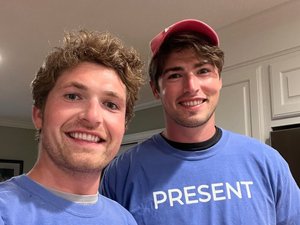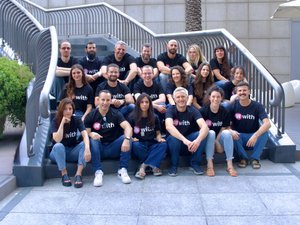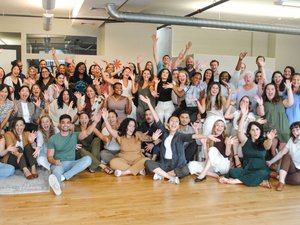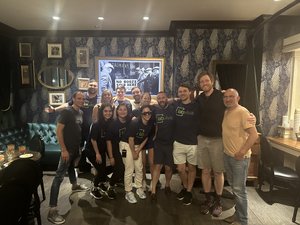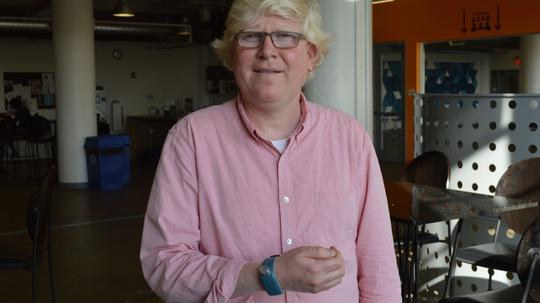
As someone who is legally blind, Fernando Albertorio is the perfect spokesman for Sunu, a Boston startup that is launching a crowdfunding campaign today for its sonar-powered smart wristband that helps blind and visually impaired people improve their mobility.
"We want to help people improve their self-confidence, their self-esteem and their independence."
The CEO and co-founder says ever since he was a child, he resisted the use of canes and other mobility aids. And he had a determination to stay active that he says was encouraged by his mother, who would always tell him, "the sky's the limit for you in terms of your abilities."
But, Albertorio says, even though he's learned how to navigate fairly well with his 20/100 vision, there would still be times in which he would accidentally run into tree branches and other obstacles.
So when he met Sunu's original inventors—Marco Trujillo, Cuauhtli Padillas and Fabiola Suarez—at MassChallenge last year and began mentoring them, he finally found a mobility aid that was not just intuitive but also discreet. So he started using the startup's wristband, called the Sunu Band, and with his science background and work on sensor technologies, Sunu's team asked Albertorio to become the startup's CEO, which he says was a "no brainer."
"The idea is we're helping people become more aware of their surroundings and know when they're about to collide into something and reduce those accidents," he says. "We want to help people improve their self-confidence, their self-esteem and their independence."
Sunu launched an Indiegogo crowdfunding campaign on Monday for its initial batch of the Sunu Band, with a goal of raising at least $50,000 and a stretch goal of raising an extra $50,000 to give it Fitbit-like capability. The startup has already raised some funding, including $50,000 it won from MassChallenge last year. It has also completed product testing with the Perkins School for the Blind and the National Federation of the Blind.
The Sunu Band uses sonar to detect what's in front of you and gives you small vibrations that increase in intensity the closer you get to an obstacle, whether it's a wall or a rope. And because it's a wristband, you can move your hand around to detect other obstacles. On indoor mode, it can detect ranges of four to five feet. For the outdoors, it can detect up to 15 feet.
The wristband also has a few other features: it doubles as a haptic clock that gives you the time of day using Morse code through vibrations; it comes with a Sunu Tag beacon that helps you find your belongings; and it can be turned off when you don't need it.
As for the Fitbit-like capability, Albertorio says the plan is to develop an activity tracking and monitoring smartphone app that couples with the wristband.
"It's all about enjoying your mobility," he says. "If you're blind, sometimes getting from here to the store or home is stressful. All you're thinking about is surviving from A to B. We want to make it so that now going from A to B is actually enjoyable and fun."
As a user of the Sunu Band, Albertorio says he's been able to avoid "embarrassing accidents" that might have happened otherwise.
"One of our users calls it a Fitbit for the blind because he blends in."
"I was rushing to a meeting in Kendall Square and I wanted to cross the street" where there was some construction, he said. "There was a rope between two cones, and I almost ran into the rope," but he was able to stop just in time because of the Sunu Band, Albertorio said.
The early prototypes for the Sunu Band were developed by co-founders Marco Trujillo and Cuauhtli Padillas in Mexico, where they let children at a Helen Keller School for the Blind use early prototypes to see how it helped them. When they tried the wristbands, the school's teachers noticed the children were moving with more confidence.
"That's kind of what got Sunu started on this path: the realization that we created something that could have an impact on the lives of children and adults and people who are blind or visually impaired," Albertorio says.
There is nothing quite like the Sunu Band on the market right now, he says. The only options right now are too expensive, not intuitive and "tend to label or stigmatize the user, causing many people to opt-out." Beyond the Sunu Band's $249 price, Albertorio says its biggest competitive differentiator is that it's discrete.
"There's nothing about this that labels me as a visually impaired individual," he says proudly of his own Sunu Band. "One of our users calls it a Fitbit for the blind because he blends in."
